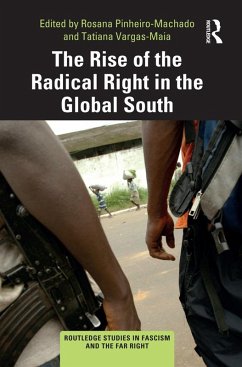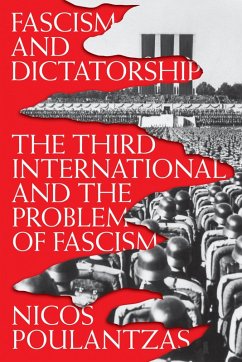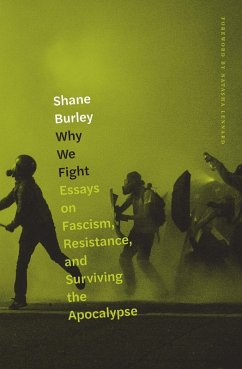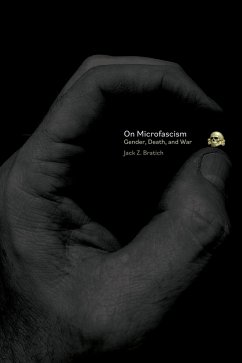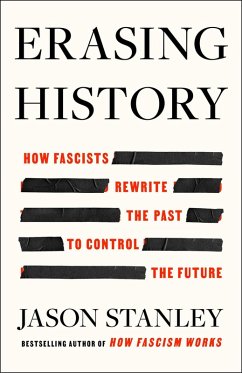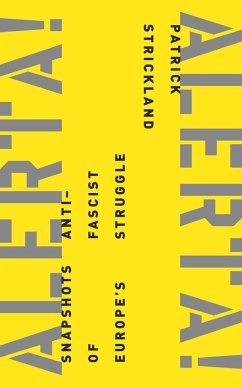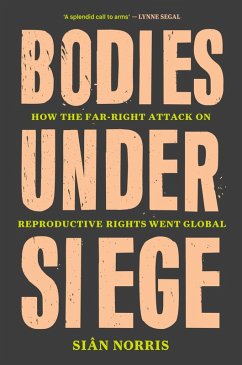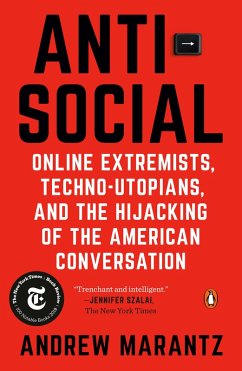eBook, ePUB
For Antifascist Futures (eBook, ePUB)
Against the Violence of Imperial Crisis
Redaktion: Goldstein, Alyosha; Trujillo, Simón Ventura

PAYBACK Punkte
6 °P sammeln!





We must, as For Antifascist Futures urges, take antifascism as a major imperative of movements for social change. But we must not limit our analysis or historical understanding of the rise of the right-wing authoritarianism in our times by rooting it in mid-twentieth century Europe. Instead we turn to a collection of powerful BIPOC voices who offer a range of anticolonial, Indigenous, and Black Radical traditions to think with.For Antifascist Futures: Against the Violence of Imperial Crisis takes seriously what is new in this moment of politics, exploring what the analytic of fascism offers fo...
We must, as For Antifascist Futures urges, take antifascism as a major imperative of movements for social change. But we must not limit our analysis or historical understanding of the rise of the right-wing authoritarianism in our times by rooting it in mid-twentieth century Europe. Instead we turn to a collection of powerful BIPOC voices who offer a range of anticolonial, Indigenous, and Black Radical traditions to think with.
For Antifascist Futures: Against the Violence of Imperial Crisis takes seriously what is new in this moment of politics, exploring what the analytic of fascism offers for understanding the twenty-first century authoritarian convergence by centering the material and speculative labor of antifascist and antiracist social movement coalitions. By focusing on the long history of BIPOC antifascist resistance that has been overlooked in both recent conversations about racial justice as well as antifascist resistance, the essays, interviews, and documents included here make clear how racialized and colonized peoples have been at the forefront of theorizing and dismantling fascism, white supremacy, and other modes of authoritarian rule.
By linking a deep engagement, both scholarly and practical, of racial justice movements with an antifascist frame, and a global analysis of capitalism the contributors have assembled a powerful toolbox for our struggles. The editors, widely recognized ethnic and American studies scholars, offer a groundbreaking collection with contributions from Johanna Fernandez, Manu Karuka, Charisse Burden-Stelly, Zoé Samudzi, and Macarena Gomez-Barris, among others.
For Antifascist Futures: Against the Violence of Imperial Crisis takes seriously what is new in this moment of politics, exploring what the analytic of fascism offers for understanding the twenty-first century authoritarian convergence by centering the material and speculative labor of antifascist and antiracist social movement coalitions. By focusing on the long history of BIPOC antifascist resistance that has been overlooked in both recent conversations about racial justice as well as antifascist resistance, the essays, interviews, and documents included here make clear how racialized and colonized peoples have been at the forefront of theorizing and dismantling fascism, white supremacy, and other modes of authoritarian rule.
By linking a deep engagement, both scholarly and practical, of racial justice movements with an antifascist frame, and a global analysis of capitalism the contributors have assembled a powerful toolbox for our struggles. The editors, widely recognized ethnic and American studies scholars, offer a groundbreaking collection with contributions from Johanna Fernandez, Manu Karuka, Charisse Burden-Stelly, Zoé Samudzi, and Macarena Gomez-Barris, among others.
Dieser Download kann aus rechtlichen Gründen nur mit Rechnungsadresse in A, D ausgeliefert werden.
About the Editors Alyosha Goldstein is a professor of American Studies at the University of New Mexico. He is the author of Poverty in Common: The Politics of Community Action during the American Century, editor of Formations of United States Colonialism (2014), and coeditor (with Jodi A. Byrd, Jodi Melamed, and Chandan Reddy) of ?Economies of Dispossession: Indigeneity, Race, Capitalism,? a special issue of Social Text (2018), (with Juliana Hu Pegues and Manu Vimalassery [Karuka]) of ?On Colonial Unknowing,? a special issue of Theory & Event (2016) and (with Alex Lubin) of ?Settler Colonialism,? a special issue of South Atlantic Quarterly (2008). Simón Ventura Trujillo is an assistant professor in the English Department at New York University and the author of Land Uprising: Native Story Power and the Insurgent Horizons of Latinx Indigeneity (2020) About the Contributors Nadia Abu El-Haj is Ann Whitney Olin Professor of Anthropology, Co-Director of the Center for Palestine Studies, and Chair of the Governing Board of the Society of Fellows/Heyman Center for the Humanities at Columbia University. She is the author of Facts on the Ground: Archaeological Practice and Territorial Self-Fashioning in Israeli Society and The Genealogical Science: The Search for Jewish Origins and the Politics of Epistemology. Her third book (Verso 2022) is a study of the figure of the traumatized soldier in the American social imaginary and its central role in reproducing contemporary American militarism. Kate Boyd is an antifascist and antiracist cultural organizer, educator, and public humanities scholar. In 2006, Kate and Cristien Storm cofounded If You Don't They Will, a Seattle-based collaboration that provides concrete and creative tools for countering white nationalism through a cultural lens. This includes creating spaces to generate visions, desires, incantations, actions, memes, and dreams for the kinds of worlds we want to live in. Charisse Burden-Stelly, assistant professor of Africana Studies and Political Science at Carleton College, is a critical Black Studies scholar of political theory, political economy, intellectual history, and historical sociology. She is the coauthor, with Gerald Horne, of W.E.B. Du Bois: A Life in American History, and is currently working on a book manuscript tentatively titled Black Scare/Red Scare: Antiblackness, Anticommunism, and the Rise of Capitalism in the United States, which examines the rise of the United States toglobal hegemony between World War I and the early Cold War at the intersection of racialcapitalism, Wall Street imperialism, anticommunism, and antiblackness. Burden-Stelly is also the coeditor, with Jodi Dean, of the forthcoming volume Organize, Fight, Win: Three Decades of Black Communist Women's Political Writings (Verso, 2022)and the coeditor, with Aaron Kamugisha, of the forthcoming collection of Percy C. Hintzen's writings titled Reproducing Domination: On the Caribbean and the Postcolonial State (University of Mississippi, 2022). She guest edited the ?Claudia Jones: Foremother of World Revolution? special issue of The Journal of Intersectionality. Her published work appears in journals including Small Axe, Monthly Review, Souls, Du Bois Review, Socialism & Democracy, International Journal of Africana Studies, and the CLR James Journal. Filipa César is an artist and filmmaker interested in the fictional aspects of the documentary, the porous borders between cinema and its reception, and the politics and poetics inherent to imaging technologies. Since 2011, she has been researching the origins of the cinema of the African Liberation Movement in Guinea Bissau as a collective laboratory of decolonizing epistemologies. The resulting body of work comprises, films, archival practices, seminars, screenings, publications and ongoing collaborations with artists, theorists and activists in particular with Diana McCarty, Sónia Vaz Borges and Sana na N'Hada, with whom she initiated the Mediateca Onshore project. Subin Dennis is a researcher with the New Delhi office of the Tricontinental Institute for Social Research, and a former journalist with the news portal NewsClick. He was a research scholar at Jawaharlal Nehru University, New Delhi and was active with the student movement before he joined NewsClick, where he wrote analytical articles on economy and politics. Daniel Denvir is the author of All-American Nativism: How the Bipartisan War on Immigrants Explains Politics as We Know It (Verso, 2020), a Visiting Fellow in International and Public Affairs at Brown University's Watson Institute, a writer in residence at The Appeal, and the host of The Dig podcast on Jacobin Radio. He is a former staff writer at Salonand the Philadelphia City Paper, and former contributing writer at the Atlantic's CityLab. His work has appeared in The New York Times, The Washington Post, The Nation, Vox, Jacobin, The Guardian's Comment Is Free, Al Jazeera America, VICE, and The New Republic. Johanna Fernández is associate professor of History at Baruch College (CUNY) and author of The Young Lords: A Radical History, recipient of the New York Society Library's New York City Book award and three Organization of American Historians (OAH) awards: the prestigious Frederick Jackson Turner award for best first book in history, the Liberty Legacy Foundation award for best book on civil rights and the Merle Curti award for best Social History. Dr. Fernández's 2014 Freedom of Information Law (FOIL) lawsuit against the NYPD, led to the recovery of the ?lost? Handschu files, the largest repository of police surveillance records in the country, namely over one million surveillance files of New Yorkers compiled by the NYPD between 1954-1972, including those of Malcolm X. She is editor of Writing on the Wall: Selected Prison Writings of Mumia Abu-Jamal and writer and producer of the film, Justice on Trial: The Case of Mumia Abu-Jamal. Her awards include the Fulbright Scholars grant to the Middle East and North Africa, which took her to Jordan; and a National Endowment for the Humanities Fellowship in the Scholars-in-Residence program at the Schomburg Center. She directed and cocurated, ¡Presente! The Young Lords in New York an exhibition in three NYC museums. She's the host of A New Day, WBAI's morning show, from 7-8am, M-F, at 99.5 FM in New York. Alyosha Goldstein is a professor of American Studies at the University of New Mexico. He is the author of Poverty in Common: The Politics of Community Action during the American Century, the editor of Formations of United States Colonialism, and has coedited special issues of Social Text, Theory & Event, and South Atlantic Quarterly. Goldstein is completing a book manuscript on colonialism, racial capitalism, and histories of Native and Black dispossession in what is presently called the United States. Macarena Gómez-Barris is a writer and author who works at the intersections of authoritarianism, the visual arts, extractivism, and the environmental and decolonial humanities. Her books include Where Memory Dwells: Culture and State Violence in Chile, Beyond the Pink Tide: Artistic and Political Undercurrents, and The Extractive Zone: Social Ecologies and Decolonial Perspectives. Her in-progress book is At the Sea's Edge: Liquidity Beyond Colonial Extinction. She is Founding Director of the Global South Center (globalsouthcenter.org) and Chairperson of Department of Social Science and Cultural Studies at Pratt Institute, Brooklyn. She has published in Social Text, GLQ, and numerous other journals and art catalogs, and is coeditor with Diana Taylor of Duke University Press Series, Dissident Acts. Elspeth Iralu (Angami Naga) is a PhD candidate in American studies at the University of New Mexico. Her research and teaching interests include Indigenous geographies and methodologies, visual culture, critical surveillance studies, and planning for decolonial futures. Iralu's current work examines the spatial surveillance of Indigenous peoples, nations, and territories in the twenty-first century to interrogate how spatial methods of counterinsurgent warfare operate as technologies of territoriality against Indigenous nations. Her writing has appeared in American Quarterly , The New Americanist, Dialogue: The Interdisciplinary Journal of Popular Culture and Pedagogy, and Species in Peril. She has worked on community projects for environment, health, and sovereignty with Indigenous nations in India and the United States. Manu Karuka is an Assistant Professor of American Studies, and affiliated faculty with Women's, Gender & Sexuality Studies at Barnard College, where he has taught since 2014. His work centers a critique of imperialism, with a particular focus on antiracism and Indigenous decolonization. He teaches courses on the political economy of racism, U.S. imperialism and radical internationalism, Indigenous critiques of political economy, and liberation. He is the author of Empire's Tracks: Indigenous Nations, Chinese Workers, and the Transcontinental Railroad (University of California Press, 2019). With Juliana Hu Pegues and Alyosha Goldstein, he coedited a special issue of Theory & Event, ?On Colonial Unknowing,? (2016) and with Vivek Bald, Miabi Chatterji, and Sujani Reddy, he coedited The Sun Never Sets: South Asian Migrants in an Age of U.S. Power (NYU Press, 2013). Dolly Kikon is a Senior Lecturer in the Anthropology and Development Studies Program at the University of Melbourne, a Senior Research Associate (SRA) at the Australia India Institute, and the host of the Melbourne Researchers in Focus Conversation series. She also serves on the Council of Advisors for The India Forum. Her research focuses on resource extraction, militarization, development, human rights, migration, gender, and political economy. Kikon's books include Living with Oil and Coal: Resource Politics and Militarization in Northeast India (University of Washington, 2019), Ceasefire City: Militarism, Capitalism and Urbanism in Dimapur (with Duncan McDuie-Ra, Oxford University Press, 2021), Leaving the Land: Indigenous Migration and Affective Labour in India (with Bengt Karlsson, Cambridge University Press, New Delhi, India, 2019), and Life and Dignity: Women's Testimonies of Sexual Violence in Dimapur (Nagaland) (Northeast Social Research Centre Publication, Guwahati, 2015). Léopold Lambert is a trained architect living in Paris. He is the editor-in-chief of The Funambulist, a bimestrial print and online magazine dedicated to the politics of space and bodies. He is also the author of four books: Weaponized Architecture: The Impossibility of Innocence (dpr-barcelona, 2012), Topie Impitoyable: The Corporeal Politics of the Cloth, the Wall, and the Street (punctum, 2015), La politique du bulldozer: La ruine palestinienne comme projet israélien (Politics of Bulldozer: The Palestinian Ruin as an Israeli Project, B2, 2016), and États d'urgence: Une histoire spatiale du continuum colonial français (States of Emergency: A Spatial History of the French Colonial Continuum, Premiers Matins de Novembre, 2021). Joe Lowndes is a professor of political science at the University of Oregon and a scholar of race, populism, and right-wing politics. He coauthored Producers, Parasites, Patriots: Race and the New Right-Wing Politics of Precarity with Daniel Martinez HoSang (University of Minnesota Press, 2019), is the author of From the New Deal to the New Right: Race and the Southern Origins of Modern Conservatism (Yale University Press, 2008), and coedited Race and American Political Development with Julie Novkov and Dorian Warren (Routledge Press, 2008). He has published extensively on populism, presidential politics, political culture, and social movements, and writes frequently for public venues including The Washington Post, The New Republic, and Dissent. His current project seeks to explain the growing authoritarian trend in U.S. politics in the United States and its implications for democracy. Allan E. S. Lumba is an assistant professor of history at Virginia Tech. His research explores the historical entanglements between racial capitalism and U.S. colonialisms in the Philippines and more broadly the Pacific from the late nineteenth century to the present. His first book, Monetary Authorities: Capitalism and Decolonization in the American Colonial Philippines, will be out in April 2022 from Duke University Press. Dian Million (Tanana Athabascan) is an Associate Professor in the Department of American Indian Studies at the University of Washington in Seattle. She is the author of Therapeutic Nations: Healing in an Age of Indigenous Human Rights, along with several enduring poems and articles: ?There is a River in Me: Theory From Life,? ?Intense Dreaming: Theories, Narratives and Our Search for Home,? and ?Felt Theory: An Indigenous Feminist Approach to Affect and History.? Million centers her work on the effect/affect of racial capitalism/settler colonialism on Indigenous family and community health in North America informed by two generations of Indigenous Feminist scholarship and activism. Million seeks to illuminate the ways in which Indigenous life reorganizes and resurges, making intentional life and kin in the face of colonial violence. Nicole Nguyen is associate professor of educational policy studies at the University of Illinois-Chicago. She is author of A Curriculum of Fear: Homeland Security in U.S. Public Schools (University of Minnesota Press, 2016) and Suspect Communities: Anti-Muslim Racism and the Domestic War on Terror (University of Minnesota Press, 2019). Keisha-Khan Y. Perry is the Presidential Penn Compact Associate Professor of Africana Studies at the University of Pennsylvania. Her research is focused on race, gender and politics in the Americas, urban geography and questions of citizenship, intellectual history and disciplinary formation, and the interrelationship between scholarship, pedagogy and political engagement. Her first book, Black Women against the Land Grab: The Fight for Racial Justice in Brazil, won the 2014 National Women's Studies Association Gloria Anzaldúa Book Prize. She is currently at work on her second book, which is focused on the ways in which state violence limits activist research and writing. Vaughn Rasberry is Associate Professor of English and Comparative Studies in Race and Ethnicity at Stanford University, where he teaches and researches literature of the African Diaspora. He is also the author of Race and the Totalitarian Century: Geopolitics in the Black Literary Imagination (Harvard UP, 2016), recipient of the Ralph Bunche Award from the American Political Science Association and an American Book Award from the Before Columbus Foundation. Zoé Samudzi is a writer whose work has appeared in The New Inquiry, Verso, The New Republic, Daily Beast, Art in America, Hyperallergic, and other outlets. She is a contributing writer at Jewish Currents. Along with William C. Anderson, she is the coauthor of As Black as Resistance: Finding the Conditions for Liberation (AK Press). Nikhil Pal Singh is Professor of Social and Cultural Analysis and History at New York University, and Founding Faculty Director of the NYU Prison Education Program. A historian of race, empire, and culture in the twentieth-century United States, Singh is the author, most recently, of Race and America's Long War (University of California Press, 2017). He is also the author of the award-winning book, Black Is a Country: Race and the Unfinished Struggle for Democracy (Harvard University Press, 2004), and author and editor with Jack O'Dell of Climin' Jacob's Ladder; The Black Freedom Movement Writing of Jack O'Dell. A new book Exceptional Empire: Race, Colonialism and the Origins of US Globalism is in-progress, and forthcoming from Harvard University Press. Singh's writing and historian interviews have appeared in a number of places including New York Magazine, TIME, the New Republic, and on NPRs Open Source and Code Switch. Anne Spice (she/they) is a Tlingit member of Kwanlin Dun First Nation, Assistant Professor in the Department of Geography and Environmental Studies at Ryerson University, and an Associate Fellow at the Yellowhead Institute. They have been actively supporting Indigenous land re-occupations since 2015, and their work dwells in the intersection of Indigenous geographies, histories and futures of Indigenous resistance, poetry and art. Their writing has been published in Environment and Society , Jacobin, The New Inquiry, and Asparagus Magazine. Cristien Storm is an antifascist and antiracist cultural organizer, writer, and politicized healer. In 2006, Cristien and Kate Boyd cofounded If You Don't They Will, a Seattle-based collaboration that provides concrete and creative tools for countering white nationalism through a cultural lens. This includes creating spaces to generate visions, desires, incantations, actions, memes, and dreams for the kinds of worlds we want to live in. Alberto Toscano is Professor in Critical Theory in the Department of Sociology and Co-Director of the Centre for Philosophy and Critical Theory at Goldsmiths, University of London, and Visiting Faculty at the School of Communication, Simon Fraser University. He is the author of The Theatre of Production: Philosophy and Individuation Between Kant and Deleuze (Palgrave, 2006), Fanaticism: On the Uses of an Idea (Verso, 2010; 2017, 2nd ed.), Cartographies of the Absolute (with Jeff Kinkle, Zero Books, 2015), Una visión compleja. Hacía una estética de la economía (Meier Ramirez, 2021), La abstracción real. Filosofia, estética y capital (Palinodia, 2021), and the coeditor of The Italian Difference: Between Nihilism and Biopolitics (with Lorenzo Chiesa, re.press, 2009), the 3-volume Handbook of Marxism (with Sara Farris, Bev Skeggs and Svenja Bromberg, SAGE, 2021), and Ruth Wilson Gilmore's Abolition Geography: Essays in Liberation (with Brenna Bhandar, Verso, 2022). Simón Ventura Trujillo is an assistant professor in the English Department at New York University. He is the author ofLand Uprising: Native Story Power and the Insurgent Horizons of Latinx Indigeneity (University of Arizona Press 2020). Sónia Vaz Borges is an interdisciplinary militant historian and social-political organizer. She received her Ph.D. in History of Education from the Humboldt University of Berlin. She is the author of the book Militant Education, Liberation Struggle; Consciousness: The PAIGC education in Guinea Bissau 1963-1978 (Peter Lang, 2019). In September 2021 she joined the History Department as assistant professor in Africana Studies at Drexel University. As part of her academic work, Vaz Borges is developing a book proposal focused on her concept of the ?walking archive.? Yazan Zahzah is a community-based researcher and organizer from Southern California. They hold an MA in Gender Studies from San Diego State University and currently work as a lecturer for the California State University system. Yazan's research examines the relationship between war, migration, surveillance, and social welfare programming. In particular, their work dissects the use of progressive rhetoric to further political violence, like with Countering Violent Extremism. Yazan is the Community Organizer at Vigilant Love in Los Angeles, CA. They are a longtime member of the Palestinian Youth Movement, a grassroots organization dedicated to the self-determination of the Palestinian People.
Produktdetails
- Verlag: Common Notions
- Erscheinungstermin: 19. April 2022
- Englisch
- ISBN-13: 9781942173649
- Artikelnr.: 63559935
Für dieses Produkt wurde noch keine Bewertung abgegeben. Wir würden uns sehr freuen, wenn du die erste Bewertung schreibst!
Eine Bewertung schreiben
Eine Bewertung schreiben
Andere Kunden interessierten sich für




